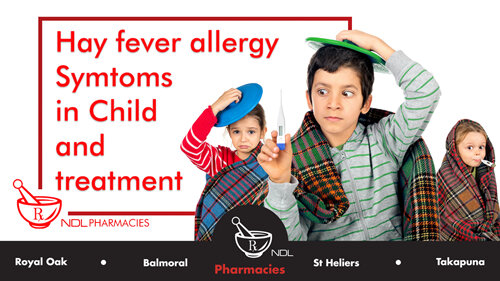St Heliers Pharmacy
St Heliers Pharmacy is your local, community pharmacy located in the heart of Royal Oak. You can order products online for urgent delivery or visit us in store. Our friendly team of qualified pharmacists are happy to help.

“Achoo!” It’s your kid’s fourth sneezing fit of the morning, and as you hand them another tissue, you wonder if these flu-like symptoms – the runny nose, congestion, and sneezing – are somewhat related to the recent weather change. If your child gets similar symptoms at the same time every year, then your skepticism is likely right: the seasonal allergies are at work!
Hay fever allergy, also known as seasonal allergic rhinitis, is a common allergy that happens during certain times of the year. This happens when outdoor moulds, trees, grasses, and weeds release pollen into the air to germinate other plants. These particles are inhaled into our respiratory systems and people who are allergic to mould spores or pollen treat these allergens as invaders. The immune system then releases histamine into the bloodstream to counter the invading pollen. This release of chemicals causes allergy symptoms.
People can be allergic to different types of pollen or mould at the same time. The type of mould or pollen someone is allergic to is determined by the time when symptoms happen. For instance, in some states the pollination takes place from February through May, grass pollens are released into the air from May through June, while weed pollen is in the air from August through October. So, children with allergies have cold-like symptoms in these months. The mould spread is at a maximum between midsummer through fall.
Even those who have never experienced allergies in the past, are prone to these allergies during peak seasons. These common child allergies don’t target a particular age but are most observed in kids who are 10 years old.
Let’s look at some hay fever symptoms and treatments.
If your child develops a cold every year during the same time, chances are that they might have an allergy. These symptoms start appearing almost suddenly and last as long as they are exposed to the allergen. The symptoms include:
Continuous sneezing
Runny nose
Sore or itchy throat
Coughing
If the person suffering has itchy, watery, and red eyes, chances are that they have allergic conjunctivitis. Kids with wheezing and shortness of breath have allergies that trigger asthma.
The regular return of sneezing and runny noses make the seasonal allergy symptoms easy to diagnose. Discuss with your doctor that your child might have allergies. The doctor will ask about the symptoms and the time they appear. However, if the doctor is unable to make a diagnosis, they may refer you to an allergist for blood tests or allergy skin tests.
The skin tests are done in one of two ways:
A purified liquid allergen is dropped onto the skin and the area is pricked with a small pricking device. If the child is allergic, the skin will swell in that area.
A small amount of allergen is injected under the skin – which stings a little but isn’t painful. If the child is allergic to the allergen, a small mosquito bite-sized lump appears around the injection site.
If a test shows an allergy, the child must also have symptoms that could lead to an early diagnosis. For example, a child whose test is positive for grass pollen and sneezes while playing in the grass is considered to be allergic to grass pollen.
The treatment of allergies depends upon how severe hay fever symptoms are? Diagnosis is the most important part of the treatment as it is important to know the type of allergens at work. In some cases, some kids get instant relief by reducing exposure to allergens.
If you see any symptoms, keep the windows closed, stay indoors, and try using air conditioning. Kids with seasonal allergies also need to wash their hands and take showers regularly. However, if reducing the exposure is not an option, there are medicines that can help ease allergy symptoms. Some useful medicines are antihistamines, nasal spray steroids, and decongestants. Most parents go with new allergy treatments and get allergy shots (immunotherapy) for their child which helps them stay safe from allergens.